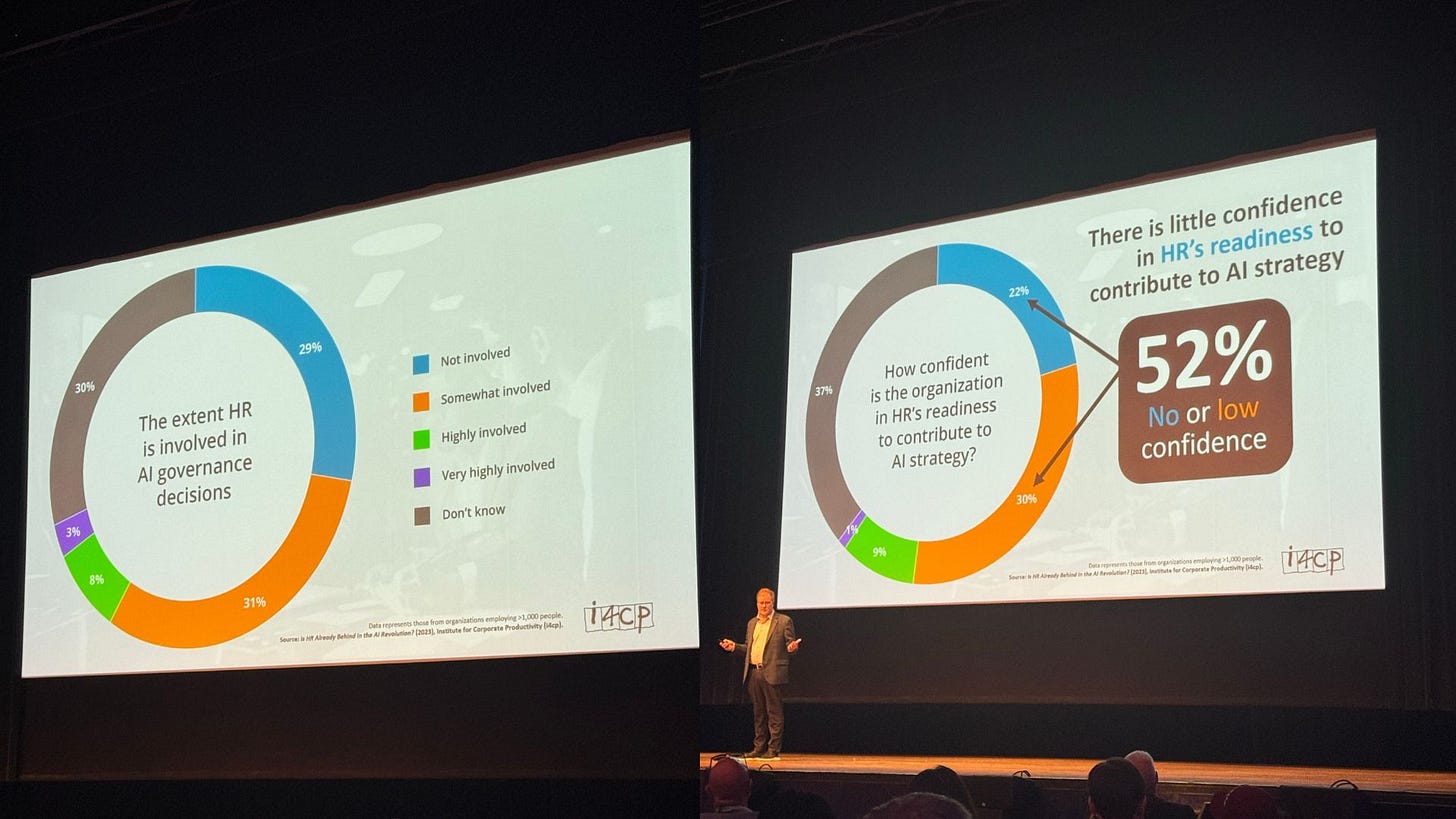HR Technology Europe 2024.
Upskilling for the AI Workforce: HR's Imperative
Welcome to FullStack HR, and an extra welcome to the 91 people who have signed up since last week.
If you haven’t yet subscribed, join the 6900+ smart, curious HR folks by subscribing here:
Happy Monday,
This will be a Monday edition that last week was spent at the first-ever HR Technology Europe conference, and thus, instead of writing the regular newsletter, I hosted a lecture about HR and AI. (Everyone, please act surprised.)
I’m not going to dwell on it, but I tried a new format and a new lecture, and in hindsight, maybe I shouldn’t have done that. It’s always scary to try new stuff, and it's always good to maybe do that while not presenting at one of the largest HR conferences in Europe…
But anyway.
The highlights from the conference?
Here are my two highlights beyond the usual networking!
Embracing AI to Upskill the Workforce
Kevin Oakes from the Institute for Corporate Productivity (I4CP) gave an excellent presentation on why HR teams must embrace generative AI. Oakes shared some eye-opening data that drove home the importance of HR getting involved with their organization's AI strategies.
According to an I4CP study of over 1,500 organizations, HR is currently woefully under-involved in AI strategy decisions.
A whopping 60% of HR teams had low or no involvement in their company's AI governance decisions. Even more concerning, over half of the organizations surveyed had low confidence in HR's readiness to meaningfully contribute to shaping their AI strategy.
This lack of HR input is a massive missed opportunity. I’ve pointed this out many times in this newsletter, and Oakes did that as well: HR undoubtedly understands the workforce better than any other corporate function.
Our expertise on talents, capabilities, learning needs, and cultural impacts should make them invaluable voices for ensuring AI is adopted in a way that benefits and upskill employees.
Oakes drew a stark contrast between the "AI Innovators" in the study who are strategically integrating AI across their organizations, and the "AI Laggards" taking a haphazard approach. The Innovators were far more likely to see gains in productivity, innovation, market performance, and maintaining a healthy culture of change.
To help us, HR, become AI Innovators, Oakes outlined 9 key strategies employed by leading organizations:
Implementing an enterprise-wide AI strategy and framework
Defining the business case for specific AI use cases
Proactively communicating about AI to reduce workforce fears
Developing programs to reskill employees on leveraging AI
Providing guardrails to govern appropriate employee AI use
Identifying opportunities to use AI for competitive advantage
Building diverse AI teams to reduce bias
Partnering with external AI vendors and consultants
Measuring ROI on AI initiatives
This all resonates deeply with me, and if you’ve listened to me in the past, this is no news but presented in a compelling way with data to back up the claims around this.
AI in the Wild: Future Skills & Preparing for the AI Workforce
Another great session highlighted the critical role prompt engineering must play as generative AI revolutionizes the workplace. Jessica Hannon from Altruistic AI presented compelling research we cannot ignore.
Jessica shared how Ferrari went from 60% to 90% success with their AI model after implementing prompt engineering training. Their experience demonstrates the immense productivity gains possible.
I have my doubts that long-term we will need “prompt engineering” as a separate thing but for now, prompt engineering represents the foundational skills needed for symbiotic human-AI collaboration. We simply need to understand how these models work and how to interact with them.
Or to put it more straightforward, it is imperative for HR and talent leaders to prioritize educating our workforce on prompt engineering and rapidly adopting generative AI capabilities. We can no longer afford to underutilize AI compared to other functions.
If we want innovative, productive, and equitable AI-powered workplaces, making prompt engineering skills a strategic priority is non-negotiable. Empowering our people to work seamlessly alongside AI will unlock unprecedented efficiency and creative potential.
The research proves waiting is not an option - the competitive advantage belongs to those who upskill their workforce on these critical skills now.
How do you stay ahead?
One thing that struc me while walking the conference floors is that there wasn’t that many Swedes there. In fact, that is rarely the case at any of these conferences.
In all other countries, it’s fairly common that you set aside time to do conferences like this. Simply to get inspired and keep up to date with what is happening when it comes to tooling, ways of working and also building networks with peers.
It’s rare to find HR professionals from Sweden doing these kind of events.
I would argue that the way we do HR in Sweden is fairly progressive but in order for us to stay progressive, these kind of events is what we need to attend. We need to keep at it and develop ourselfes and our organizations.
Hence I hope I’ll see more of you at next years HR Tech Europe in Amsterdam!
Set aside 4-5 of March 2025 and I’ll see you there!



